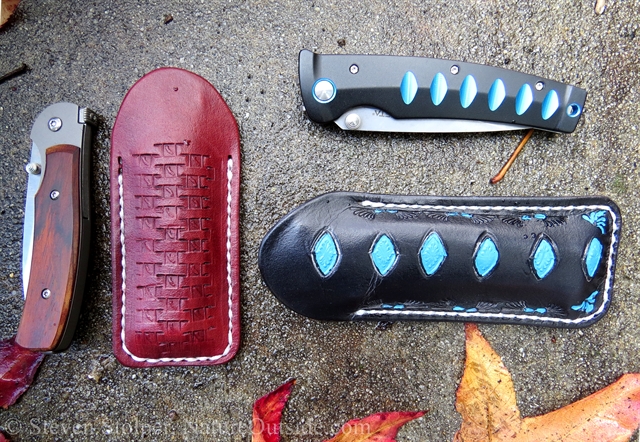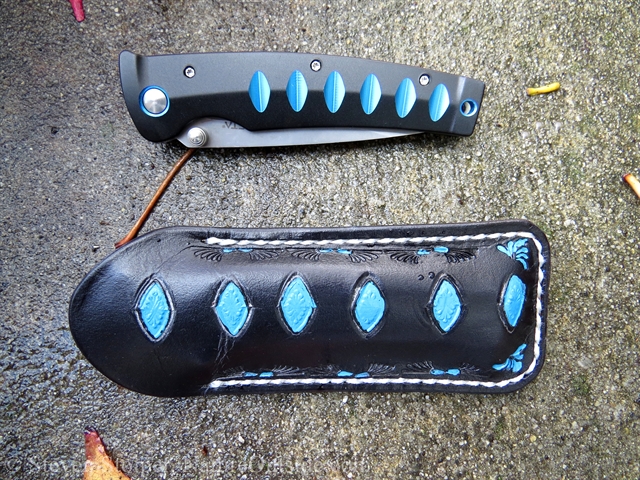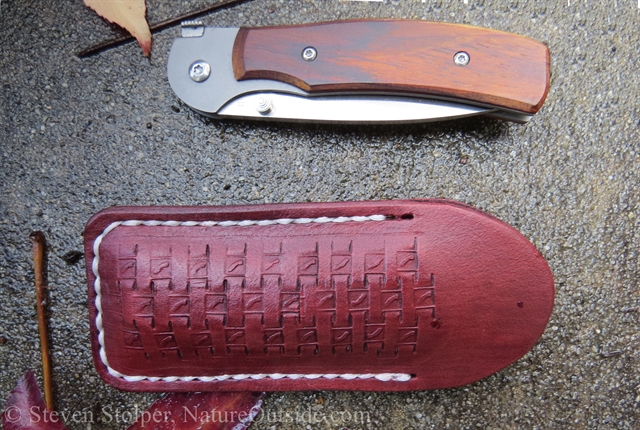
Not long ago, I wrote about my failed search for a gentleman’s folding knife. I ended up purchasing several less expensive knives to replace the expensive one I was forced to return.
These less expensive knives come with pocket clips attached to them. The clip slips over the top of your pants pocket so that the knife sits inside, easy to fish out at a moment’s notice.
But the clip is visible to casual observers, and I prefer to keep my pocket knife discretely in my pants pocket. This allows me to carry it unobtrusively in an office setting and while around town running errands.
A Pocket Full of Troubles
But having the knife floating around inside my pocket is not ideal. I don’t want it to open accidentally as I move. And I want to keep the usual detritus you find in one’s pocket (lint, dirt, bits of paper) from getting into the folding mechanism. It’s also important to keep the knife from scratching or denting other items I keep in my pockets.
Enter the slip pouch…
The Leather Slip Pouch
The slip pouch solves these problems. It keeps the knife from opening accidentally. It protects the knife from debris. And it safeguards other items in my pocket that can be damaged by the knife.
You make it by sewing together two pieces of vegetable tanned leather. What can be simpler! You slip the knife into the pouch from the top, and the friction of the leather keeps it within, even when held upside-down and shaken.
Although it’s simple to make, there’s a little science in its construction. The leather pieces deform when the knife is slipped between them. So you must size the pieces so there is enough room to fit the knife inside. But don’t make them too big! Otherwise there won’t be enough friction to hold the knife. And a large pouch is uncomfortable to carry in your pocket. You may be familiar with the old bushcraft saying…
Is that a large slip pouch in your pocket, or are you just glad to see me?
– Not Mae West
The pouch is made from thin pieces of vegetable tanned leather. So you can tool and dye them to make a custom sheath that expresses your individuality. I’m a terrible leather worker because I do it so rarely. But I enjoy the process of making and carrying something I’ve designed.
I recommend you try to make one yourself – and don’t worry about how “pretty” it turns out. Throw yourself into the project and have fun!
Two of My Pouches
Here are the first two pouches I made. They’re far from perfect. But their mine! And the more of them I make, the more my skills will improve.

This modern Japanese pocket knife is inspired by the katana. I tooled my pouch in a similar style. I painted my designs with leather paint to resemble the knife.

For a more traditional pocket knife, I tooled a basket weave that includes the outline of the state of California, my home. But I got distracted and some of the Californias are upside-down!
How to Make a Leather Slip Pouch
Below is a wonderful video by leather worker Ian Atkinson of Leodis leatherwork. Ian makes terrific instructional videos, and I appreciate the time he takes away from his business to share his knowledge and skills.
In this video, Ian shows us how to craft a leather slip pouch. I have used his approach (with my own variations) to make several pouches for my new folding knives. It’s a lot of fun, and a great beginner project!
Here is Ian’s video. To view it, click the image below and then click “Watch this Video on YouTube.” The link will take you to YouTube, which is the only place he permits viewing of his work.
Have you made a slip pouch? If you send me a picture of a slip pouch you made for your folding knife, I will post it at the bottom of this article.
Related Articles on NatureOutside
How to Make a Deerskin Pouch – 5 Easy Steps!
Simple Leather Project – Coyote and Night
Beginner Leatherworking Project
For fun facts and useful tips, join the free Bushcraft Newsletter.



Leave a Comment